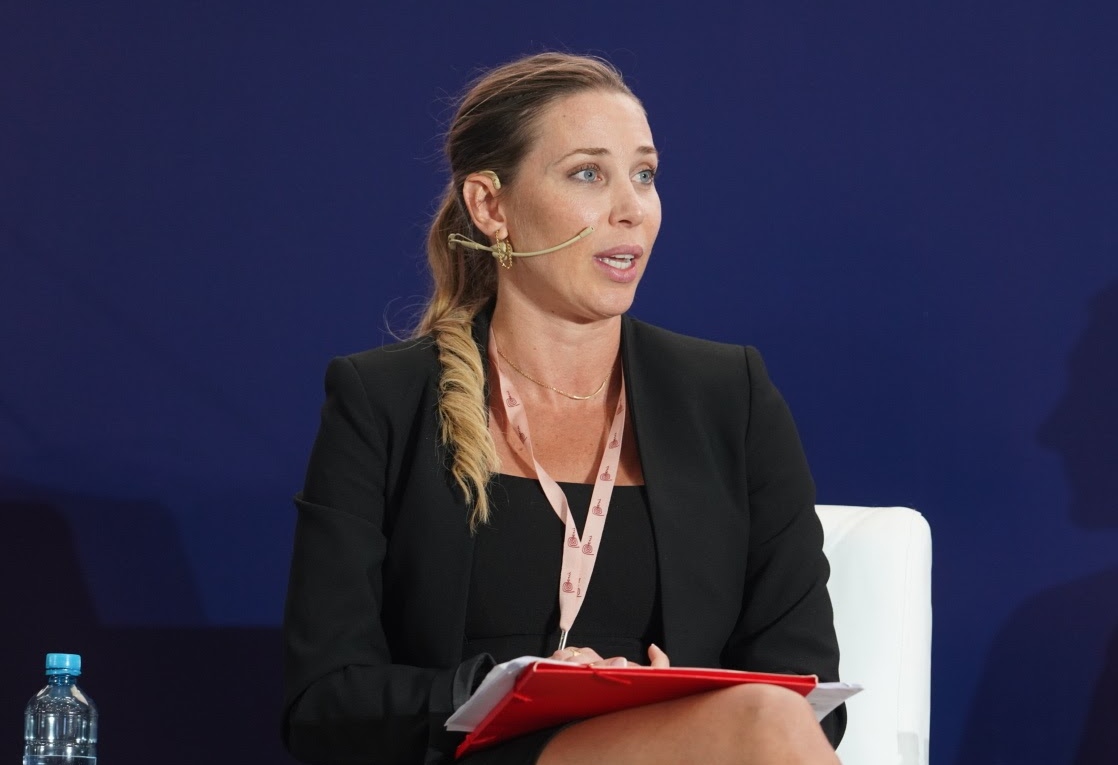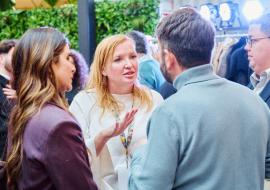Q & A with Tamara Redondo, TSTT Steering Committee

Ms. Tamara Redondo, welcome to this series of interviews with members of the Steering Committee of the Tourism and Society Think Tank.
Consultant in Excellence Management, entrepreneurship and positioning of luxury, excellence and high quality oriented companies (2010-present), she has accompanied SMEs to compete with local identity, personalisation, smart sales, business management and smart investments.
He is a specialist in positioning SMEs in the tourism sector through the analysis, management and alignment of Big Data, data mining, trends, artificial intelligence and logistics engine and interpretation of reality through robotics and accurate prediction, but at the same time with an important capacity to promote the democratisation of luxury, services of excellence and defend society, cultures and local traditions against the power of control capitalism and large technology companies and the risks that accompany digital globalisation.
Dear Ms. Redondo, what do you think is the current situation of the tourism industry in the world?
Good morning, first of all, thank you for conducting this interview.
In my opinion, the current situation of the tourism industry in the world is characterised by three circumstances:
-
We are in the post-COVID era, (which in a way we are still living with). Tourism has been the most affected. It has been and continues to be a very critical situation. Many establishments and businesses related to the tourism industry have been closed, and in other cases, employees have had to be made redundant, who have not been reinstated when it is time to return to work. There is currently a disproportionate lack of personnel. This is due to the fact that the hotel and catering sector tends to be a sector of temporary contracts, which are rarely permanent and require training and experience.
-
The global logistics crisis. As mentioned above, the shortage of staff also extends to carriers. With energy and petrol costs so high, the transport of goods and services is causing difficulties and a shortage of goods and services for industry. Also hard hit due to the pandemic and geopolitical interests. There is a trade war, between the United States and China, with the implementation of trade limits and restrictions.
-
The war in Ukraine. It is affecting the whole world. It is causing an unprecedented energy crisis and an increase in inflation exceeding 10% in many cases. As a result it is affecting the price of goods and services. And reducing the ability of tourists to travel. As a result, many suppliers, intermediaries and travel agencies have suffered, with bookings and reservations prior to the rise in inflation, causing them losses.
As long as the war in Ukraine and the logistical crisis continue, the projection is that it will get worse for at least another couple of years and we must learn to live with it.
What do you think are the most significant changes in the luxury industry in recent years?
What does luxury mean? It comes from lust. And lust in this case is understood as consumption that is not needed, i.e. basic necessities or basic necessities. For example, yachts, spas, romantic experiences, brand shopping, etc. .... A literally generalised concept.
For Tourism, the word Luxury means in a professional way; an equation where the user or client, can enjoy high quality services and products and unique experiences. Due to the high costs of these services. Both providers and consumers are very demanding and often have very high expectations.
Before COVID, the luxury industry was an emerging and new market, thanks to technology, diversity of information, economic boom, globalisation, prosperity, eagerness to experience new things. And because of the pandemic it has gone down a lot. But it is picking up again. Having the barriers sometimes of government restrictions. And having more demanding consumers who are looking for experiences focused on health and wellbeing, sustainability, security, new experiences, freedom, cultural, etc.
Tourism and Luxury are closely related, what do you think are the keys to this type of tourism?
Luxury tourism is the crème de la crème. It is exclusive and is at the forefront of offering unique experiences and trends.
The key to highlight in this type of tourism is that it is at the summit and at the top of the sector, it is an example to follow, being in this way, an indicator of trends and innovation for the sector.
Luxury tourism always has a higher level of investment.
Given your experience, what is new about the Tourism and Society Think Tank for the tourism industry?
Tourism and Society Think Tank is a space that brings together conditions that allow the tourism sector, knowledge and experience, thanks to the members that make up the Think Tank and its collaborators. Since they are professionals in the sector and also in other related sectors. And having a lot of experience over time and at an international level. Thanks to their links with universities, specialised centres, managers, clients, etc.
The Think Tank provides the sector with debates, studies, successful experiences, solutions, offering proposals, informing about trends, etc.
Having as colleagues, for example, specialists in technology, communication, public policy, among many others.
You are proud to be a leading member of the Think Tank.
Why do you consider that high investments can be important for tourism development?
High investments are always very favourable for tourism development, based on the principle of economy of scale. For example, by implementing a hotel chain, it is possible to optimise by minimising costs and improving the quality of services. Working, demanding quality standards, and considerably increasing new jobs.
It also allows the sharing of successful management experiences. This way, better access to the user, the tourist, with better communication worldwide.
It is a good reason to unite different cultures and to promote the craftsmanship of each country in a sustainable and high quality way. Generating a favourable environment for tourism and taking care of security.
What about the development of SMEs and micro SMEs?
The development of high investments, creates the need for many services and products, which can be served by SMEs and micro SMEs; logistics, cleaning, transport, maintenance, entertainment, etc.
It generates significant economic growth; it creates and generates jobs, provides the state with income and flows towards economic development.
Large companies represent a locomotive for raising and increasing quality standards in SMEs and micro-SMEs.
Do you think that many tourist destinations have a lot of improvisation in their tourism investment programmes?
He considered that yes, there are many places that practice a lot of improvisation, because the tourism sector is no stranger to the business world, where there is innovation and innovation is always also sometimes linked to experimentation, without market studies, without studies of real demand, but nevertheless, it often does not suffer much failure, or failure is not fatal, because the nature of the sector means that it is always possible to rescue tangible assets such as real estate and establishments that could be used for other things, although failure can also often lead to ruin, and there are many places in the world, for example in China, Germany, Africa, where failure can be totally catastrophic.
Do you think that, in general, managers of tourist destinations and the tourism industry have well-defined objectives, or is it you, the companies specialised in tourism development and investment, who should support this definition?
Yes, I understand that many managers have well-defined objectives, especially those that are better known, such as profitability, occupancy rate, sustainability and many others. However, the expertise and knowledge and know-how is also always evolving because this market is a dynamic market, especially with the new developments linked to new technologies. And also to external factors, external to the sector, which are sometimes represented as threats, such as pandemics, wars, environmental crises, and even economic crises, among others. Therefore, it is necessary to support the managers of this sector so that they know how to deal with and carry out the issue of adapting to these realities, and that they have clear objectives, but also that they take into account all the factors so that they can achieve success.
In such a way, unity is always strength, both managers of tourist destinations and the tourism industry are always wise to rely on companies specialising in development and investment, as they are at the forefront, and integrate specialists from different fields necessary to achieve success.
As the president of the TSTT, Mr. Antonio Santos, says, "mixing product and feelings is an art", in this same line of post-pandemic world, what is the situation of communication in luxury tourism?
With regard to what the president, Antonio Santos, said, the speciality of luxury is mainly characterised by a combination of experiences, emotions, but of course without forgetting a minimum level of demands so that the client is satisfied and at the same time is left with unforgettable experiences. And that is not always easy, because the type of customer who demands luxury is a connoisseur, a customer who is very sensitive to detail. And of course the experience is part of that. These are very, very important standards in the luxury world.
Do you feel that the pandemic has introduced changes in the behaviour of tourists and travellers, or after the lifting of travel restrictions has everything remained relatively unchanged?
Of course the pandemic has changed tourist behaviour, especially among the more sensitive age groups or people who have suffered the loss of close loved ones. They are more conscious of the issue of protection, of their own physical integrity and health security. And therefore it has also affected the tourist in other aspects, people are looking for more open, greener places, a different kind of tourism, not mass tourism, not agglomerations. Although there is also a very indifferent age group, especially young people or indifferent customers in this case.
When asking some of your colleagues in the TSTT, they all agree on your important contributions, do you think that the coordinated work will serve to...?
Yes, I think that coordination is a very important element for the success of the Think Tank's contribution, because of course we are an integrated group of different professionals and specialists, with different professional backgrounds and this enriches the Think Tank's proposal and of course coordination would be something very important and therefore the team counts on it and it is a plus that we have and we should always have it as a key to success and that could differentiate us from other specialised groups.














